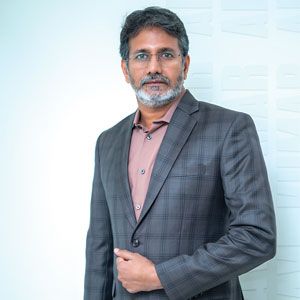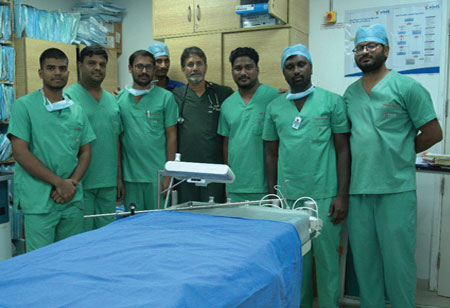
The Indian cardiology field has undergone a huge transformation over the years and it has now become highly advanced. More than 60 million people in India are affected by diseases like coronary artery disease and hypertension. Consequently, the significance of this medical specialization in public health is beyond dispute. The technological advances in procedures of angioplasty and stent placements have brought about a new era of treatment, which, in turn, has significantly reduced the mortality rates. But, there are still challenges in cardiology that can be solved only through the adoption of a patient-oriented model, which can be based on the specific needs and choices of the patients. Thus, the requirement for the best and fully trained cardiac specialists is becoming more and more intense every day.
Dr. Ravi Kumar Aluri is the one who is driving this transformation through his patient-centric approach. His distinctiveness is based on his patient-centric approach. He listens to them actively and is attentive to their issues. He puts transparency as the first priority by correctly informing his patient of the situation and giving the patient the assurance of getting the best treatment.
Moreover, he carries out procedures with a lot of expertise, focus, and a strong commitment without any fail. His track record reveals a very high success rate of 99.99 percent for a wide range of procedures, including even the intricate ones such as Transcatheter Aortic Valve Replacements (TAVRs).
Exceptional Expertise & Experience
The cardiology career of Dr. Ravi Kumar Aluri started in 1997, which was the beginning of a job that demanded devotion to first-class patient care. He was one of the first few to accept transradial procedures in 2002, and thus, he demonstrated his dedication to using new techniques for better patient results. Through the performance of over 22,000 coronary procedures and 18,000 transradial/ulnar procedures, he has gained considerable experience in the treatment of various cardiac conditions.
His knowledge goes beyond the standard procedures and includes c o m p l e x angioplasty and stenting procedures, including interventions for left main (LMCA) lesions, triple vessel disease, primary angioplasties, bifurcation lesions, chronic total occlusions, and rotablation procedures. In addition, he is a specialist in pacemaker implantations, device closures, transcatheter valve replacements, and various peripheral vascular interventions.
Innovative Treatment Approaches
Through his dedication to the ongoing learning about the new developments in cardiology, Dr. Ravi guarantees allround care for a lot of patients who are looking for his help with various coronary interventional procedures. He has acknowledged the change of healthcare in India which is brought by technological innovations and he has smoothly integrated those developments into his practice.
He has gained expertise in CTO (Chronic Total Occlusion) interventions with micro-catheters and crossboss catheters which makes it possible to navigate through previously inoperable occlusions. These technological advancements not only improve the outcomes of clinical procedures but also extend the benefits of minimally invasive surgeries to a wider range of patients, thus reducing recovery time, complications, and healthcare costs.
Optimism & Growth Orientation
Dr. Ravi’s educational journey has been a pleasant and rewarding one because he always chose the path of his choice. He completed his post-graduation in medicine at Kasturba Medical College (MAHE), Mangalore which has significantly shaped his personality and developed the best characteristics a doctor should have. His medical career in cardiology started in 1997. He started as an Assistant Professor at NIMS and then he moved to Global Medical and Educational Research (Global Hospitals), Hyderabad, where he became a professor. Now, he is the Director & Chief Interventional Cardiologist at KIMS, Kondapur, Hyderabad. This journey has been full of excitement and difficulties, thus giving him many chances to try out and improve his professional skills. He is always on track with the latest news in cardiology to provide comprehensive care for his thousands of patients who consult him and have various coronary interventional procedures.
Dr. Ravi’s dream for the cardiology sector in India is that every cardiac patient should get the best treatment with the best equipment at a reasonable price. “No patient should be turned away because JUNE ASIA BUSINESS OUTLOOK 17 there are not enough cardiologists or necessary equipment anywhere in India. The government hospitals should increase their network so that they can cover the whole country and be provided with enough doctors and equipment,” he says.
In his practice, Dr. Ravi has applied & included the most important technological innovations in interventional cardiology to enhance patient results & widen the scope of treatable diseases
Adopting Technological Advancements
In his practice, Dr. Ravi has applied and included the most important technological innovations in interventional cardiology to enhance patient results and widen the scope of treatable diseases. Transcatheter Aortic Valve Replacement (TAVR) has been improved with the valve design and deployment system innovations, thus it is now possible to apply this technology to a wider range of patients. Percutaneous Coronary Intervention (PCI) techniques have significantly advanced, with drug-eluting stents that are now made of better polymers and drugs to reduce the rate of restenosis and thrombosis. Intravascular imaging techniques such as optical coherence tomography (OCT) and fractional flow reserve (FFR) are now the ones that are leading to interventions and optimizing results. The application of robotic systems in PCI has raised the precision and cut down the radiation exposure to the operator.

Besides, there are also new developments to improve the navigation and treatment of previously inoperable occlusions. The Watchman device has turned into a wellworking and safe replacement for anticoagulation therapy for patients who need Left Atrial Appendage Closure (LAAC). The Mitral and Tricuspid Valve interventions have also been made more effective with the help of new devices like MitraClip for mitral regurgitation. Advanced cardiac imaging technologies make it possible for interventional cardiologists to customize interventions more accurately to each patient’s anatomy, thus they can improve the clinical outcomes and extend the advantages of minimally invasive procedures to a larger number of patients. Leveraging these advancements, Dr. Ravi shortens the recovery time, complications, and healthcare costs.
Future Roadmap
In the future, Dr. Ravi is hopeful about what interventional cardiology will look like. Extensive research is being carried out to create new devices that will enhance the TAVR safety. To illustrate, the Embolic Protection Catheter is being improved to be able to catch embolic debris that is released during TAVR and when this is done it will greatly increase the safety of the procedure. TAVR treatment is also being looked at for cases of aortic regurgitation where calcification is not necessary as an anchor. The other innovation that looks very promising is a tricuspid valve replacement system for the treatment of tricuspid valve disease. In the next five years, Dr. Ravi foresees a fast development of interventional cardiology and he is determined to be at the leading edge of these developments by constantly updating and improving his practice so that he can offer his patients with better devices and procedures which are more advanced, thus achieving significant growth in this way.
Dr. Ravi Kumar Aluri , Director & Chief Interventional Cardiologist, KIMS Hyderabad
Dr. Ravi Kumar Aluri is a pioneering cardiologist transforming Indian cardiology through his patient-centric approach and advanced interventional techniques. With over 22,000 coronary procedures and a 99.99 percent success rate, he leads as the Director & Chief Interventional Cardiologist at KIMS, Hyderabad, integrating cutting-edge technologies to enhance patient outcomes.
We use cookies to ensure you get the best experience on our website. Read more...